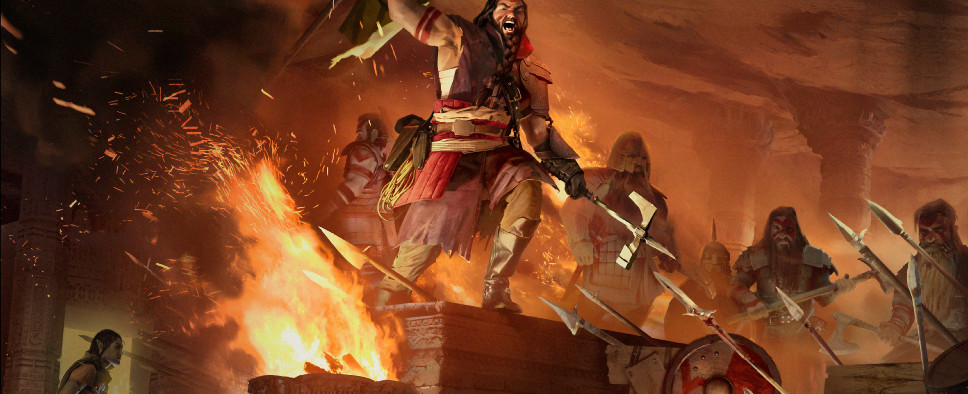OtherSide Games' Paul Neurath on Kickstarter Backlash
-
Category: News ArchiveHits: 1814

Looking Glass and OtherSide Games' founder Paul Neurath has penned a blog to reply to a recent wave of negative press about crowdfunded video games, which was overwhelmingly focused on Kickstarter-funded games. According to Neurath, the failure of a few high-profile projects shouldn't dissuade backers from supporting titles (including the title he is currently working on, Underworld Ascendant) on the crowd-funding platform, especially considering failures are equally common for publisher-funded projects:
The Kickstarter game campaigns I've looked at are careful to call out that game development entails certain risks. That the project might get delayed, or features change, or get cut. These same risks face games not funded through Kickstarter. Plenty of publisher-funded games fall short of expectations; more than a few get cancelled.
Risks aside, the fact is that a bunch of really good games have been Kickstarted. Wasteland II, Shovel Knight, Shadowrun Returns, Divinity: Original Sin and Faster than Light to name just some. And more are on their way. It happens to be a wonderful way for fans to support indie games they want to see made. Particularly since these are often the same creative games that might otherwise struggle to get funded through traditional sources.
I have a unique perspective to bring to this debate. I founded LookingGlass, which developed games such as Ultima Underworld, System Shock, Terra Nova and Thief. During those years we struggled at times to get our game concepts funded by the established game publishers. We were not shy to take creative risks, such as doing a first-person stealth game, which at the time was an unproven concept. Being innovative tended to make it harder to get traction with game publishers.
It is with that perspective that I decided to Kickstart the first game at our new studio, a reboot of the classic Ultima Underworld franchise. We decided to reach out directly to our fans for funding. Our hope is that fans will share our vision and passion, and help us to see the game be made.
As was true at Looking Glass, we are committed to delivering on our vision. Looking Glass never bailed from a project that we had under production. The few projects that failed to reach completion had the plug pulled by folks outside of our studio, without our having a say in the decision. Let me also note that for each game we put into production, in addition to whatever is crowd funded, we are setting aside from our studio's own funds a minimum of two hundred thousand dollars as a reserve to cover contingencies. It's one measure of our commitment to deliver.
We usually narrowly focus on RPGs and tangential genres here on GameBanshee, but I wouldn't quite feel comfortable if I didn't also point a few of the aforementioned articles to give an idea of the scope and level of the debate. The article Neurath cited directly is from Ars Technica, and it's an opinion piece that argues that Kickstarter encourages over-promising with its policies:
With Kickstarter, developers are often expected to make detailed promises about a game's features, budget, and development timeline before that development has even started or when it is barely off the ground. The culture of the service encourages developers to be as transparent as possible about the entire process, making any modification or delay an extremely public failure. That's in contrast to traditional development, where unannounced features may be attempted and canceled quietly behind closed doors. The fact that Kickstarter developers are often small independent outfits with less experience with the rigors of development doesn't make these problems any better.
And this gets back to Molyneux's quote about the "let's just say anything" nature of Kickstarter projects. When the site doesn't give a penny to projects that don't meet their minimum stated goal, developers are naturally going to lowball their budgets (consciously or unconsciously) to maximize their chances of getting any funds at all. Faced with a skeptical public and competition from dozens of other projects (many with established developers behind them), Kickstarter projects are also going to be as optimistic as possible regarding promised features in order to attract those backers. Being sober and realistic, in this case, is bad for business.
While Kickstarter's policies technically treat funded projects as a legal contract to deliver on promised pledge rewards, in practice there's almost always no penalty for failing to meet the goals laid out on a Kickstarter page (short of a class-action lawsuit from the backers). The only protection backers really have is the fact that a developer's reputation will be ruined if they fail to deliver a fact that's little protection when it comes to newly formed studios full of no-name developers.
When Kickstarter's structure offers every benefit to overpromising and little-to-no penalty for not delivering, it's no wonder that those behaviors are so common to projects on the site. You don't need to be a serial, pie-in-the-sky over-promiser like Peter Molyneux for your crowdfunding dreams to outpace your funding and timing realities. When it comes to Kickstarter, everyone is Peter Molyneux, and the backers are the ones enabling their often unachievable dreams.
A few other examples include a list of failed or long overdue Kickstarter projects compiled by Kotaku and this piece from GamesIndustry. All the pieces I listed were written after a backlash from the backers of Godus, a god game from 22Cans, Peter Molyneux's current studio, which, so far, has failed to deliver the features that were promised during the crowd-funding campaign more than 2 years ago.

